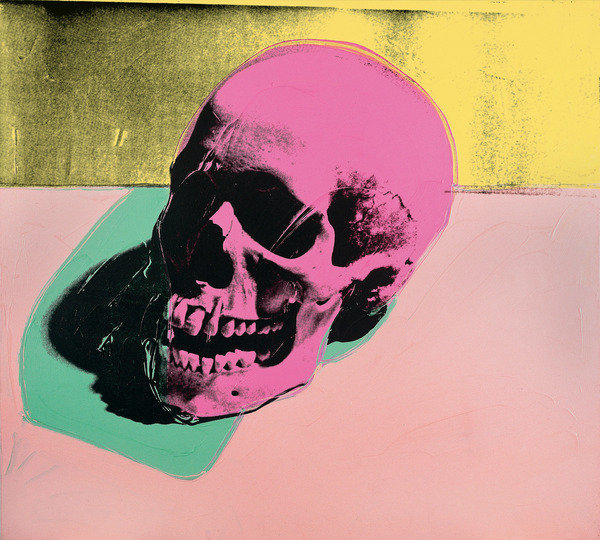Pop and the Sixties
dal 18/1/2012 al 1/9/2012
Segnalato da
Arman
Peter Blake
George Brecht
Marcel Broodthaers
Cesar
John Chamberlain
Gerard Deschamps
Francois Dufrene
Oyvind Fahlstrom
Domenico Gnoli
Richard Hamilton
Raymond Hains
David Hockney
Robert Indiana
Jasper Johns
Allan Kaprow
Konrad Klapheck
Roy Lichtenstein
Robert Morris
Lowell Nesbitt
Nam June Paik
Pino Pascali
Mel Ramos
Robert Rauschenberg
Martial Raysse
Mimmo Rotella
George Segal
Richard Serra
Cy Twombly
Jacques de la Villegle
Wolf Vostell
Andy Warhol
Tom Wesselman
Karola Kraus
18/1/2012
Pop and the Sixties
Museum Moderner Kunst MUMOK, Wien
Pieces from the museum's permanent collection. With over 60 artworks, the exhibition looks at the broader historical situation surrounding the special exhibition on Claes Oldenburg, establishing links and analogies to the inernational context of the Pop Art phenomenon, with works by Robert Indiana, Roy Lichtenstein, Andy Warhol, David Hockney, Richard Hamilton and Raymond Hains.

Curator Karola Kraus
This February at the mumok: Pop is everywhere! Parallel to the world’s largest
exhibition of the early works of Claes Oldenburg, one of the principal figures in the
American Pop Art scene, the museum presents Pop and the Sixties showing pieces
from its permanent collection. With over 60 artworks, the exhibition looks at the
broader historical situation surrounding the special exhibition on Claes Oldenburg,
establishing links and analogies to the inernational context of the Pop Art
phenomenon, with works by Robert Indiana, Roy Lichtenstein, Andy Warhol, David
Hockney, Richard Hamilton and Raymond Hains.
Pop Art
The artworks of Pop Art quickly became icons of a broad social and artistic
transformation. No other development in art during the 20th Century managed in
such a short time to gain such notority in the international art market and then enter
into prestigous collections. The depiction of the “American Way of Life” based on
everyday experience as expressed in Pop Art influenced new conceptions of what
constitutes reality in European art movements during the 1960s including Nouveau
Réalisme, Fluxus and Arte Povera. After years of the dominance of abstraction, which
had increasingly deteriorated to an academic fashion, the return of the real in art was
in the ascendant. This change in art reflected a society in transition that appeared to
be dominated by consumerism, advertising and the media. With a selection of
representative works from the collection, the exhibition illustrates the
interrelationship between reality and art found during this exciting chapter in the
history of art.
Thanks to the art collectors Peter and Irene Ludwig and the Austrian Ludwig-
Stiftung, the mumok possesses an internationally renowned collection of Pop Art.
The Ludwig family was one of the earliest and most consistent collectors of Pop Art.
With foresight and meticulous attention to high quality, they were able to put
together one of the world's most important collections.
Exhibition
The exhibition features many famous works including prominently Andy Warhol's
Orange Car Crash (1963), one of the major works in the museum's collection, where
behind the cult of celebrity and glamour that went along with the person Warhol, a
poignant confrontation with death appears amidst a commercially-oriented and
materialistic society. While Roy Lichtenstein's work Mirror in Six Panels No. 1 (1970)
created a discourse on the relationship between reality and illusion; Robert Indiana’s
Love Rising /Black and White Love (for Martin Luther King) (1968) opened a
historical-political dimension with its commentary on racial discrimination; Jasper
Johns’s work, in turn, explores the relation between realistic representation and the
object world; and Robert Rauschenberg’s Combine Paintings bring together the
heterogeneity of painting, photography and various objects within a single work.
Together with the protagonists of American Pop Art, the works of their British
contemporaries, Peter Blake, Richard Hamilton and David Hockney along with the
European realisms of the 1960s all give us a good idea of the extent to which the
fascination with everyday culture had become a broad, international phenomenon.
Enormous enlargements (Domenico Gnoli, Raymond Hains), unexpected
combinations (Konrad Klapheck) and images that are literally ripped from the street
(Mimmo Rotella) celebrate the seeming banalities of our world and at the same time
establish a connection to the work of Claes Oldenburg. In this way, the exhibition
develops the larger context of the special exhibition, showing the many parallels and
analogies between artists at the time. It is precisely through alienation and
deformation that we are able to look beyond everyday structures to gain a new sense
of reality. The thematic arrangement that sets American and European positions in
relation to each other enables new comparisons and perspectives both on the period
and the artworks caught between forthright depictions of reality and extravagant
glamour.
Artists
Arman / Peter Blake / George Brecht / Marcel Broodthaers / César
John Chamberlain / Gérard Deschamps / François Dufrêne / Öyvind Fahlström
Domenico Gnoli / Richard Hamilton / Raymond Hains / David Hockney
Robert Indiana / Jasper Johns / Allan Kaprow / Konrad Klapheck / Roy Lichtenstein
Robert Morris / Lowell Nesbitt / Nam June Paik / Pino Pascali / Mel Ramos
Robert Rauschenberg / Martial Raysse / Mimmo Rotella / George Segal
Richard Serra / Cy Twombly / Jacques de la Villeglé / Wolf Vostell / Andy Warhol
Tom Wesselmann
Image: Andy Warhol, Skull, 1976. Acryl und Siebdruck auf Leinwand 183 x 203 cm. Foto: mumok © A. Warhol Foundation for the Visual Arts, New York/ VBK Wien 2012
Press contacts Eva Engelberger, T +43 1 52500-1400 eva.engelberger@mumok.at
Barbara Hammerschmied, T +43 1 52500-1450 barbara.hammerschmied@mumok.at
mumok
Museumsplatz 1, 1070 Vienna
Levels -1 and -3
Opening hours Monday: 2 – 7 p.m.
Tuesday to Sunday: 10 a.m. – 7 p.m.
Thursday: 10 a.m. – 9 p.m.
Tickets
Normal € 9,–
Reduced € 7,20 or € 6,50



